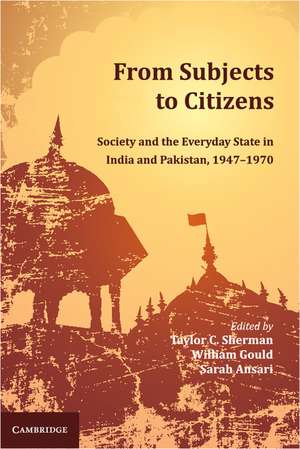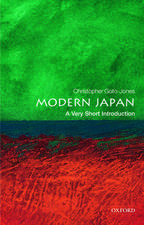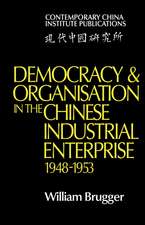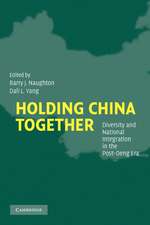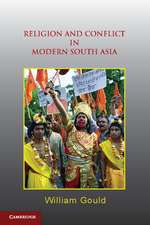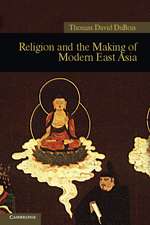From Subjects to Citizens: Society and the Everyday State in India and Pakistan, 1947–1970
Editat de Taylor C. Sherman, William Gould, Sarah Ansarien Limba Engleză Hardback – 5 mar 2014
Preț: 554.63 lei
Preț vechi: 623.18 lei
-11% Nou
Puncte Express: 832
Preț estimativ în valută:
106.14€ • 110.40$ • 87.63£
106.14€ • 110.40$ • 87.63£
Carte tipărită la comandă
Livrare economică 15-29 aprilie
Preluare comenzi: 021 569.72.76
Specificații
ISBN-13: 9781107064270
ISBN-10: 1107064279
Pagini: 258
Ilustrații: Illustrations
Dimensiuni: 159 x 237 x 12 mm
Greutate: 0.52 kg
Ediția:New.
Editura: Cambridge University Press
Colecția Cambridge University Press
Locul publicării:New York, United States
ISBN-10: 1107064279
Pagini: 258
Ilustrații: Illustrations
Dimensiuni: 159 x 237 x 12 mm
Greutate: 0.52 kg
Ediția:New.
Editura: Cambridge University Press
Colecția Cambridge University Press
Locul publicării:New York, United States
Cuprins
Acknowledgements; Introduction Taylor C. Sherman, William Gould and Sarah Ansari; 1. Personal law and citizenship in India's transition to independence Eleanor Newbigin; 2. From subjects to citizens? Rationing, refugees and the publicity of corruption over independence in UP William Gould; 3. Performing peace: Gandhi's assassination as a critical moment in the consolidation of the Nehruvian state Yasmin Khan; 4. Migration, citizenship and belonging in Hyderabad (Deccan), 1946–1956 Taylor C. Sherman; 5. Punjabi refugees' rehabilitation and the Indian state: discourses, denials and dissonances Ian Talbot; 6. Sovereignty, governmentality and development in Ayub's Pakistan: the case of Korangi Township Markus Daechsel; 7. Everyday expectations of the state during Pakistan's early years: letters to the Editor, Dawn (Karachi), 1950–1953 Sarah Ansari; 8. Concrete 'progress': irrigation, development and modernity in mid-twentieth century Sind Daniel Haines; 9. Partition narratives: displaced trauma and culpability among British civil servants in 1940s Punjab Catherine Coombs; Contributors; Index.
Descriere
The book offers a fresh and timely perspective on the broader field of early postcolonial South Asian history.
